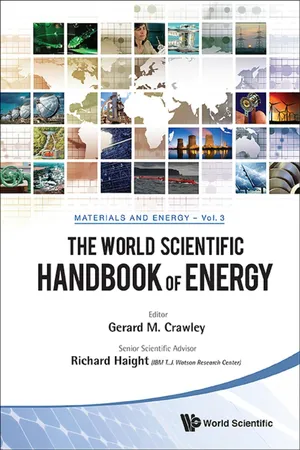
- 588 pages
- English
- ePUB (mobile friendly)
- Available on iOS & Android
World Scientific Handbook Of Energy, The
About this book
Competition for energy resources worldwide will almost certainly increase because of population growth and economic expansion, especially in countries such as China and India, with large populations. In addition, environmental concerns with the use of certain energy sources add a complicating factor to decisions about energy use. Therefore there is likely to be an increased commitment around the world to invest in energy systems.
The World Scientific Handbook of Energy provides comprehensive, reliable and timely sets of data on energy resources and uses; it gathers in one publication a concise description of the current state-of-the-art for a wide variety of energy resources, including data on resource availability worldwide and at different cost levels. The end use of energy in transportation, residential and industrial areas is outlined, and energy storage, conservation and the impact on the environment included.
Experts and key personnel straddling academia and related agencies and industries provide critical data for further exploration and research.
Experts in these various areas who provide relevant data for further exploration and research include former Head of the Nuclear Reactors Directorate of the CEA; Director of the Potential Gas Agency, who leads a team of 100 geologists, geophysicists and petroleum engineers; former CEO of an Icelandic engineering company that specializes in the design, construction and operation of “Kalina” binary power plants for geothermal, biomass and industrial waste heat recovery applications; Chairman of the Scottish Hydrogen and Fuel Cells Association; former Director of the Geo-Heat Center at the Oregon Institute of Technology, who received the Patricius Medal from the German Geothermal Association for “his pioneer work in the direct use of geothermal energy”; Division Director of NETL's Strategic Center for Coal, who provides expert guidance and consultation to major DOE-funded clean coal technology and carbon sequestration demonstration projects; an internationally recognized expert in the physics and technology of Inertial Confinement Fusion (ICF); former Senior Scientist and Director of the Center for Distributed Generation and Thermal Distribution with Washington State University, who was responsible for state policy, technical assistance to resource developers and investigations related to geothermal energy development; a main author on the 2005 Billion Ton Report and 2011 Billion Ton Update; and many more extremely well published and well known individuals straddling academia and related agencies and industries.
Forewords
Foreword (74 KB)
Foreword-Japanese (1,841 KB)
Contents:
- Introduction
Gerard M Crawley (Marcus Enterprises, USA) - Energy, Power, Units, and Conversions
Gerard M Crawley (Marcus Enterprises, USA) - Coal
Thomas Sarkus (National Energy Technology Laboratory, USA)
Adrian Radziwon and William Ellis (KeyLogic System Inc, USA) - Petroleum Liquids
William L Fishe (University of Texas at Austin, USA) - Natural Gas
John B Curtis (Colorado School of Mines, USA) - Nuclear Power
Bertrand Barré (AREVA, France) - Magnetic Fusion Energy
R J Goldston and M C Zarnstoff (Princeton Plasma Physics Laboratory, USA) - Progress Toward Inertial Fusion Energy
Erik Storm (Lawrence Livermore National Laboratory, USA) - Energy from Photovoltaics
Ignacio Rey-Stolle (Technical University of Madrid, Spain) - Concentrating Solar Thermal Power
Wes Stein (CSIRO, Australia) - Biomass
Mark Downing and Anthony F Turhollow Jr (Oak Ridge national Laboratory, USA) - Geothermal Energy
Gordon Bloomquist (Center for Distributed Generation and Thermal Distribution (Retired))
John Lund (Oregon Institute of Technology, USA)
Magnus Gehringer (World Bank/ESMAP) - Hydropower and Pumped Storage
Torbjørn K Nielsen (Norwegian University of Science and Technolog, Norway) - Wind Energy
Jos Beurskens and Arno Brand (Wind Energy Unit of the Energy Research Centre, the Netherlands) - Ocean Energy
Ian Bryden (University of Edinburgh, UK) - Ocean Thermal Energy Conversion
Gérard C Nihous (University of Hawaii, USA) - Capacitive Electric Storage
Lu Wei and Gleb Yushin (Georgia Institute of Technology, USA) - Batteries
Habiballah Rahimi-Eichi and Mo-Yuen Chow (North Carolina State University, USA) - Fuel Cells and the Hydrogen Economy
John T S Irvine, Gael P G Corre, and Xiaoxiang Xu (University of St Andrew, UK) - Electrical Grids
Róisin Duignan and Mark O'Malley (University College Dublin, Ireland) - Energy Use and Energy Conservation
V Ismet Ugursal (Dalhousie University, Canada) - The Earth's Energy Balance
Gerard M Crawley (Marcus Enterprises, USA)
Readership: Scientists, engineers and policymakers; undergraduates, graduates and researchers in energy studies.
Frequently asked questions
- Essential is ideal for learners and professionals who enjoy exploring a wide range of subjects. Access the Essential Library with 800,000+ trusted titles and best-sellers across business, personal growth, and the humanities. Includes unlimited reading time and Standard Read Aloud voice.
- Complete: Perfect for advanced learners and researchers needing full, unrestricted access. Unlock 1.4M+ books across hundreds of subjects, including academic and specialized titles. The Complete Plan also includes advanced features like Premium Read Aloud and Research Assistant.
Please note we cannot support devices running on iOS 13 and Android 7 or earlier. Learn more about using the app.
Information
Table of contents
- Cover
- Half Title
- contents
- Title
- Copyright
- contents
- Foreword
- Chapter 01
- Chapter 02
- Chapter 03
- Chapter 04
- Chapter 05
- Chapter 06
- Chapter 07
- chapter 8
- chapter 9
- chapter 10
- chapter 11
- chapter 12
- chapter 13
- chapter 14
- chapter 15
- chapter 16
- chapter 16
- Chapter 18
- Chapter 19
- Chapter 20
- Chapter 21
- Chapter 22
- Index
- abt